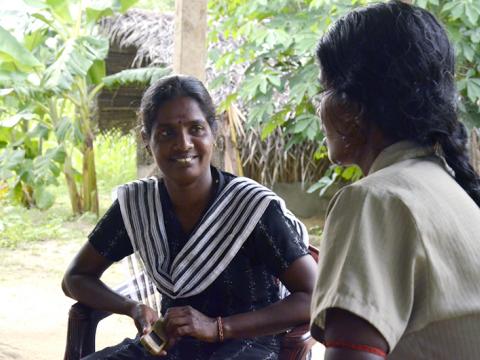From healing wounds to healing hearts

Helping those who are in need is Bamini’s passion.
During the war when there was little employment available in the conflict zone, she volunteered in the hospital. Putting a band-aid on a scraped knee, dressing a wound, and wiping away tears, and helping with the vaccinations were her responsibilities.
Her passion drove her to take a course in nursing and eventually join the Kilinochchi hospital as a nurse.
But with all her medical skills, she was best at healing hearts.
Like many wives in the North, Bamini never saw her husband again.
“After the tsunami (2004) there was a big need for mental health support in the affected areas and the doctors at the hospital asked for volunteers who could simply give a listening ear to those who had undergone loss and were with hurting hearts,” said Bamini, 45.
“I know the agony of not having someone to talk to when you are undergoing a loss,” she said, “Most of us don’t need a solution to our pain because there are no answers. Just being able to talk to someone who’d listen eases the pain.”
Bamini’s husband was forcibly recruited by the armed forces during the war leaving her and her three children (then 2, 7, and 15). Like many wives in the North, Bamini never saw her husband again. But she continued to listen to those in pain and sharing grief helped her realise she was not alone.
When World Vision first introduced the REMIND mental health project in the North following the returning of communities, Bamini naturally became a Community Support Officer (CSO) of the project. As a CSO, she was trained in listening, guiding and counselling and to identify and direct those who need medical support or psychosocial support further.
“The best thing about the training is that they first helped us get in touch with our own pain and take steps onto recovery. It helped us better support others.”
“The best thing about the training is that they first helped us get in touch with our own pain and take steps onto recovery,” she said. “It helped us better support others.”
“People don’t realise that depression is an illness, that might need medication, but now they understand my role and come to me for support. Some even call me late at night,” she says.
There are 42 families who receive her patient listening ear, care and direction. Bamini also works with different age groups and assists children who have been through trauma return to normalcy.
Her own children have also taken after her and support their peers when they are going through difficult times or guide them to her.
Today she is part of the cadre of the The Medical Office of Health and continues to support her community.
“Even though the war is no more it will take a long time to recover from its memory,” said Bamini.
The REMIND project, assisted by the Ministry of Health and funded by AUSAid was designed specifically to meet the psychological needs of the returned communities. The project implemented in Kilinochchi, Mannar, Mullaitivu, Vavuniya and Jaffna Districts in the Northern Province has 60 CSOs like Bamini who are supporting the families.
The REMIND project has also built group-support for the beneficiaries and continues drawing therapy for children. There are mothers clubs who learn how to deal with issues. IPTG (Inter personal Therapy Group) or Group counselling helps the affected community come together, identify their needs and support each other to journey towards healing.
The REMIND also introduced integrated income generation activities to help people gain a sense of normalcy and hope to keep themselves occupied with new plans for the future.